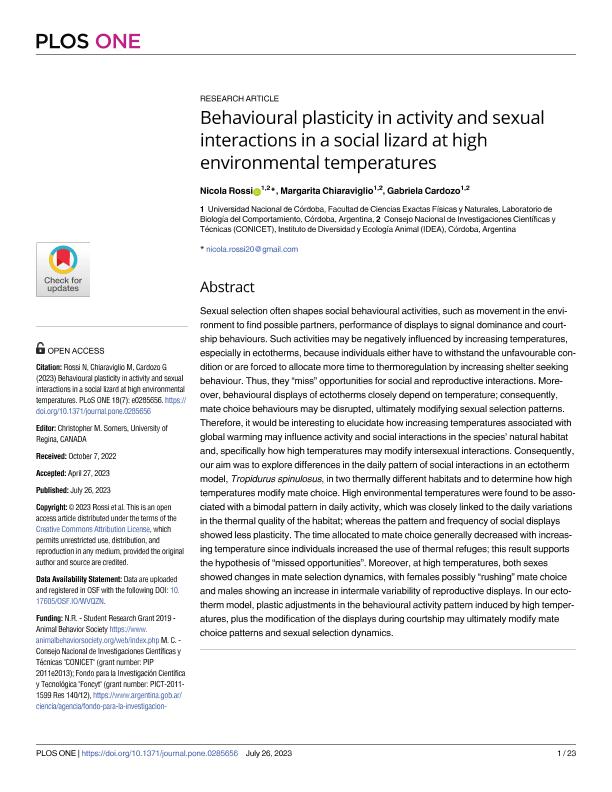Mostrar el registro sencillo del ítem
dc.contributor.author
Rossi, Nicola

dc.contributor.author
Chiaraviglio, Margarita

dc.contributor.author
Cardozo, Gabriela
dc.date.available
2024-02-14T14:57:18Z
dc.date.issued
2023-07
dc.identifier.citation
Rossi, Nicola; Chiaraviglio, Margarita; Cardozo, Gabriela; Behavioural plasticity in activity and sexual interactions in a social lizard at high environmental temperatures; Public Library of Science; Plos One; 18; 7-2023; 1-23
dc.identifier.issn
1932-6203
dc.identifier.uri
http://hdl.handle.net/11336/226869
dc.description.abstract
Sexual selection often shapes social behavioural activities, such as movement in the environment to find possible partners, performance of displays to signal dominance and courtship behaviours. Such activities may be negatively influenced by increasing temperatures, especially in ectotherms, because individuals either have to withstand the unfavourable condition or are forced to allocate more time to thermoregulation by increasing shelter seeking behaviour. Thus, they “miss” opportunities for social and reproductive interactions. Moreover, behavioural displays of ectotherms closely depend on temperature; consequently, mate choice behaviours may be disrupted, ultimately modifying sexual selection patterns. Therefore, it would be interesting to elucidate how increasing temperatures associated with global warming may influence activity and social interactions in the species’ natural habitat and, specifically how high temperatures may modify intersexual interactions. Consequently, our aim was to explore differences in the daily pattern of social interactions in an ectotherm model, Tropidurus spinulosus, in two thermally different habitats and to determine how high temperatures modify mate choice. High environmental temperatures were found to be associated with a bimodal pattern in daily activity, which was closely linked to the daily variations in the thermal quality of the habitat; whereas the pattern and frequency of social displays showed less plasticity. The time allocated to mate choice generally decreased with increasing temperature since individuals increased the use of thermal refuges; this result supports the hypothesis of “missed opportunities”. Moreover, at high temperatures, both sexes showed changes in mate selection dynamics, with females possibly “rushing” mate choice and males showing an increase in intermale variability of reproductive displays. In our ectotherm model, plastic adjustments in the behavioural activity pattern induced by high temperatures, plus the modification of the displays during courtship may ultimately modify mate choice patterns and sexual selection dynamics.
dc.format
application/pdf
dc.language.iso
eng
dc.publisher
Public Library of Science

dc.rights
info:eu-repo/semantics/openAccess
dc.rights.uri
https://creativecommons.org/licenses/by-nc-sa/2.5/ar/
dc.subject
BEHAVIOUR
dc.subject
GLOBAL WARMING
dc.subject
PHENOTYPIC PLASTICITY
dc.subject
LIZARD
dc.subject.classification
Zoología, Ornitología, Entomología, Etología

dc.subject.classification
Ciencias Biológicas

dc.subject.classification
CIENCIAS NATURALES Y EXACTAS

dc.title
Behavioural plasticity in activity and sexual interactions in a social lizard at high environmental temperatures
dc.type
info:eu-repo/semantics/article
dc.type
info:ar-repo/semantics/artículo
dc.type
info:eu-repo/semantics/publishedVersion
dc.date.updated
2024-02-14T11:37:50Z
dc.journal.volume
18
dc.journal.pagination
1-23
dc.journal.pais
Estados Unidos

dc.description.fil
Fil: Rossi, Nicola. Consejo Nacional de Investigaciones Científicas y Técnicas. Centro Científico Tecnológico Conicet - Córdoba. Instituto de Diversidad y Ecología Animal. Universidad Nacional de Córdoba. Facultad de Ciencias Exactas Físicas y Naturales. Instituto de Diversidad y Ecología Animal; Argentina
dc.description.fil
Fil: Chiaraviglio, Margarita. Consejo Nacional de Investigaciones Científicas y Técnicas. Centro Científico Tecnológico Conicet - Córdoba. Instituto de Diversidad y Ecología Animal. Universidad Nacional de Córdoba. Facultad de Ciencias Exactas Físicas y Naturales. Instituto de Diversidad y Ecología Animal; Argentina
dc.description.fil
Fil: Cardozo, Gabriela. Consejo Nacional de Investigaciones Científicas y Técnicas. Centro Científico Tecnológico Conicet - Córdoba. Instituto de Diversidad y Ecología Animal. Universidad Nacional de Córdoba. Facultad de Ciencias Exactas Físicas y Naturales. Instituto de Diversidad y Ecología Animal; Argentina
dc.journal.title
Plos One

dc.relation.alternativeid
info:eu-repo/semantics/altIdentifier/doi/http://dx.doi.org/10.1371/journal.pone.0285656
Archivos asociados
